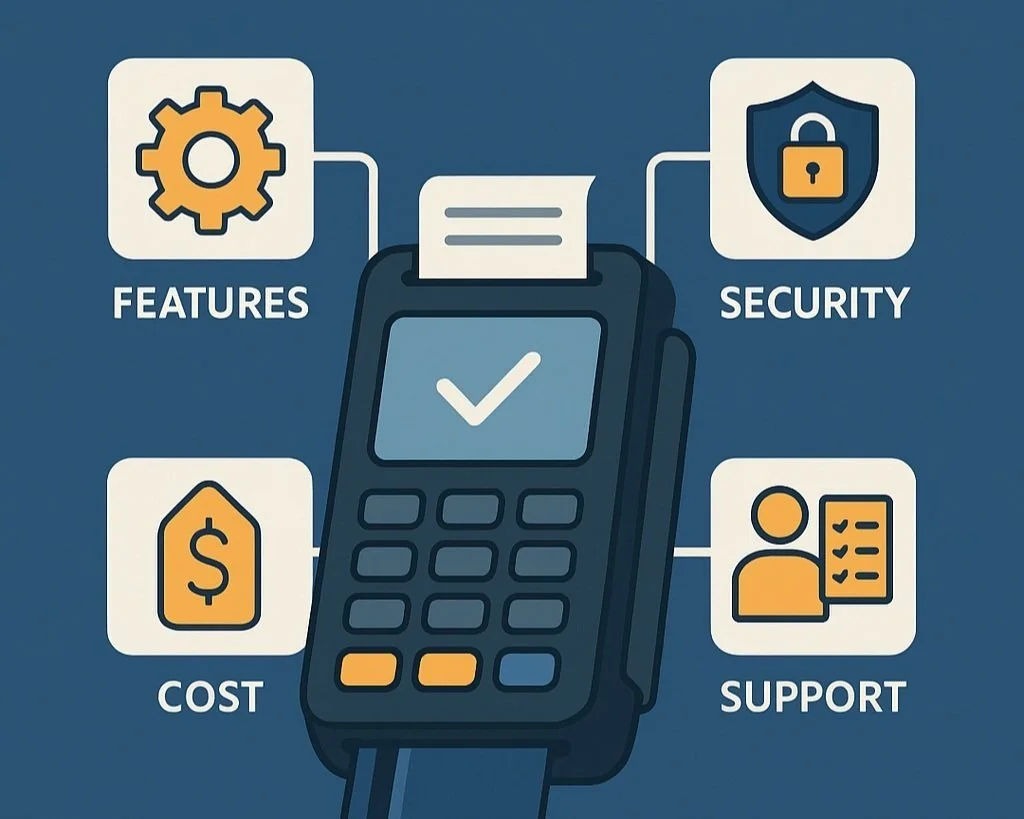IN THIS LESSON
Whether you're just starting out or looking to switch providers, choosing the right way to accept card payments is a key decision for any UK business.
But with so many options, price plans and providers out there, it can be hard to know where to begin.
This guide breaks down the most important things to consider — in plain English — including what costs to expect, and how to make sure you're not paying more than you need to.
CLICK TO EXPAND
-
Start by thinking about how your customers will pay you:
In person? (using a card machine or PDQ terminal)
Online? (via website checkout or payment link)
Over the phone? (using a virtual terminal)
On the go? (with a mobile card reader and app)
Your payment method will shape which provider and pricing model is best for you.
-
There are several types of fees to watch out for. Here’s a breakdown of the most common charges:
A. Terminal Rental (for PDQ/card machines)
If you're using a physical card machine, there is usually a monthly rental charge.
Countertop terminal: £10–£15 per month
Portable/Wi-Fi terminal: £15–£20 per month
Mobile/GPRS terminal: £20–£25+ per month
✅ Tip: For smaller businesses or sole traders, app-based card readers (e.g. Square, SumUp) have no rental fees — you just buy the reader outright (usually under £50).
B. Transaction Charges (Per Sale)
Every time you take a card payment, you’ll be charged a fee — either a flat rate or a percentage of the sale amount.
Debit card (UK): around 0.2%–0.6% per transaction
Credit card (UK): around 0.6%–1.5%
American Express: often higher, around 2%–3%
Fixed-fee providers (e.g. SumUp, Zettle): typically charge 1.69% per transaction
✅ Tip: Businesses with higher volumes can usually negotiate lower rates. Always ask!
C. Additional & Hidden Fees
Be aware of these common extra charges:
PCI DSS Compliance Fee: Around £5–£15/month (can be avoided with some providers or bundled into pricing)
Authorisation Fees: A few pence per transaction
Minimum Monthly Service Charge: If you don’t process enough sales, you may still pay a minimum fee
Settlement Fees: Charges for transferring funds into your bank account (not common, but worth checking)
International Card Charges: Higher fees (often 2%–3%) for non-UK cards
Foreign Exchange (FX) Fees: Applied when converting currencies — watch out if you sell to overseas customers
-
Check the fine print before agreeing to anything:
Long-Term Contracts: Some providers lock you into 12–48 month contracts — these can be expensive to cancel early
No Contract Options: App-based readers like SumUp and Zettle offer flexible, pay-as-you-go models
Exit Fees: Make sure there are no costly penalties for leaving
✅ Tip: Always ask for a full breakdown of charges and make sure everything is in writing.
-
Payment issues can mean lost sales, so choose a provider with:
UK-based support
Fast response times
Good online reviews
Transparent reporting tools to help you track payments and fees
-
Compare Providers: Don’t settle for the first quote. Use tools like Merchant Compare to get side-by-side comparisons.
Understand Your Statement: Know what each fee means — if you don’t understand it, ask.
Avoid Unnecessary Extras: Some providers push costly add-ons (e.g. terminal insurance, paper receipts) you might not need.
Check for Bundled Pricing: Some providers offer simpler pricing with fewer surprises — these can be easier to manage.
Summary: What to Look For in a Card Payment Solution
Final Thoughts
The right card payment solution depends on your business type, size and how your customers pay. Don’t be rushed into a deal — especially one with long contracts or confusing pricing.
At Merchant Compare, we help UK businesses like yours compare the best card payment providers, find the lowest rates, and avoid common traps.
🔍 Compare now or speak to an expert – no pressure, no jargon, just practical advice.


